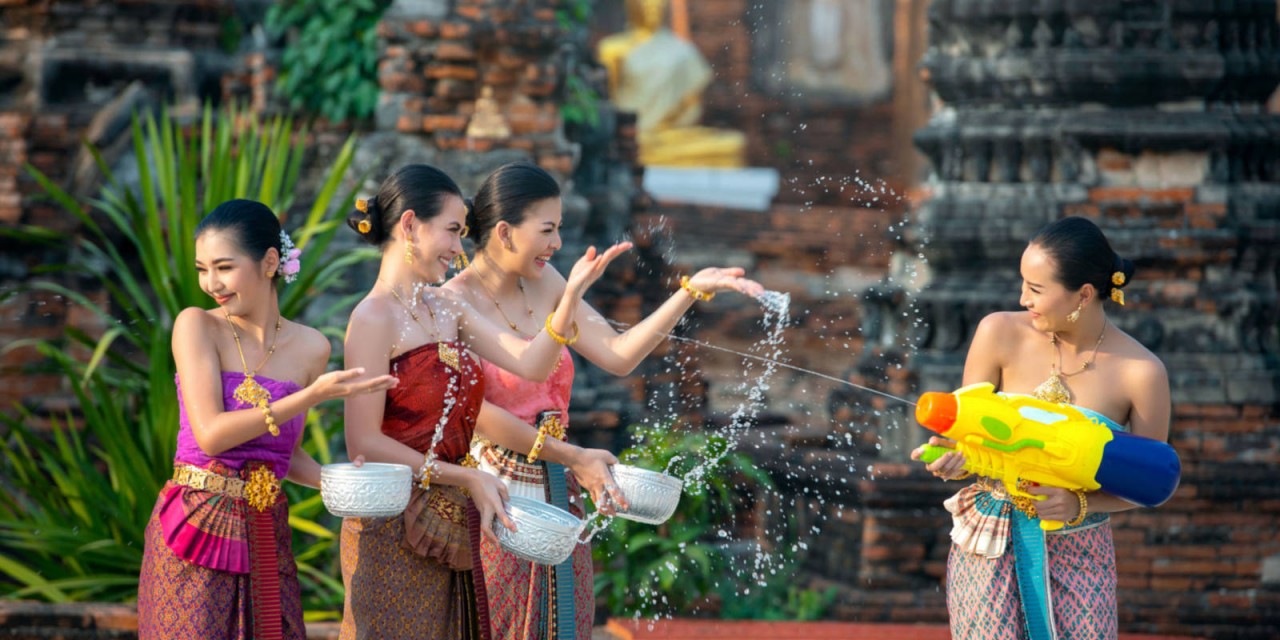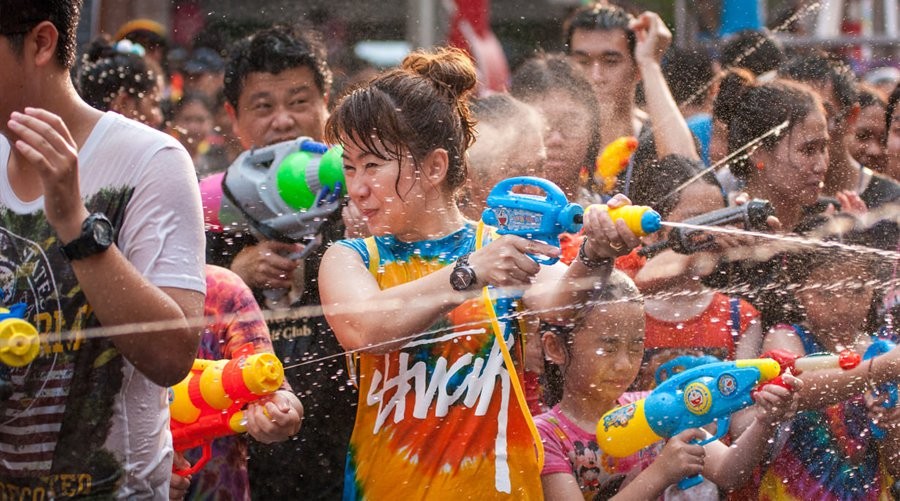
Unique and bustling Songkran Water Splashing Festival in Thailand
Latest
 |
| Songkran festival has ancient origins. (Photo: Bangkok Post) |
Songkran is celebrated to mark the traditional Thai New Year, with the custom of splashing water, symbolizing purification.
On the afternoon of December 13, 2023, UNESCO announced their decision to recognize the Songkran Festival as an UNESCO Cultural Heritage, immediately after this decision, activities to commemorate this honorable event was held in Bangkok starting from December 14.
Songkran is held from April 13 to April 15 every year to mark the traditional Thai New Year. The festival is known for its tradition of water splashing, which symbolizes purification. Songkran is also an occasion to pay respect to elders, make offerings to monks, and enjoy traditional Thai food and music.
Next year, the Thai Government plans to extend the celebration throughout April to promote the festival as a "soft power" for Thailand.
Deputy Director General of the Tourism Authority of Thailand in charge of marketing and communications, Mr. Chattan Kunjara Na Ayudhya said that Thailand is focusing on promoting "soft power" temporarily called "5F", including: Fight ( Martial Arts), Food, Festival, Fashion and Film.
Ancient festival
Songkran has a colorful past that some scholars believe stems from an ancient Hindu festival marking the harvest season and the beginning of the new year.
The water element, significant in both Hinduism and Buddhism, plays a central role in rituals such as sacrifices to the gods, and water is a symbol of the washing away of sins.
This festival has been carried out since the 11th century by the Khmer Kingdom, which once ruled part of present-day Thailand. They called it “Sangkran” or “Songkran”, derived from the Sanskrit word “saṃkrānti” , which means “astrological passage”.
According to the traditional Thai Lunar Calendar, the first new moon day of the 5th month is considered the first day of the new year. It usually falls on April 13 of the solar calendar.
Thai people used to consider Songkran as the first day of the year until 1889, when King Chulalongkorn (Rama V) changed the first day of the year to April 1. In 1941, the first day of the year was moved to January 1 by the Government of Marshal Plaek Phibunsongkhram, to align with the Western Gregorian holiday.
Thailand's traditional New Year (according to the Lunar Calendar) moves to April 13, celebrated with the three-day Songkran holiday.
During the Khmer Empire, people bathed during Songkran because they believed it helped cleanse their souls of bad karma and free the souls of their deceased ancestors to return to their homeland.
As Theravada Buddhism flourished in Thailand, Songkran underwent changes.
The focus of this festival shifts towards creating merit, with people offering food to monks at temples. This tradition, known as “tam bun,” remains an essential part of traditional New Year celebrations today.
During the Ayutthaya Kingdom (1350-1767), Songkran became an elaborate royal ceremony.
The King leads the procession, presents offerings to Buddha Statues and participates in the "Buddha bathing" ceremony. The ritual of washing Buddha statues is still widely practiced today.
Although Thailand has celebrated New Year's Day on the international calendar for more than 80 years, Songkran Day remains the more important festival for most Thais.
Millions of people studying or working away from home take advantage of the opportunity to take a three-day vacation home to be with their families. Therefore, April 14 is also called Family Day. The Government often extends the holiday period by one or two days, creating a long weekend to boost tourism.
 |
| Songkran brings joy to everyone, both locals and tourists. (Photo: Bangkok Post) |
"Water splashing fight"
Water splashing is the central activity at today's Songkran Festival, with water guns of all shapes and sizes available at the stores. The Songkran Festival attracts millions of visitors every year. International tourists freely participate and are enthusiastically welcomed by local people.
Since everyone is free to have fun these days, everyone is in a happy mood. Buckets, basins, water guns, etc, all are used to splash water on each other amid joyful laughter.
However, the origin of the water splashing activity remains a mystery. Cultural scholar Sujit Wongthet believes that "water wars" are encouraged and applied in modern times to promote tourism.
He noted that a poem about Songkran written during the reign of King Rama III makes no mention of water splashing.
Some scholars believe that water splashing began after King Chulalongkorn celebrated the Thai New Year in 1989.
Today, Songkran is a vibrant celebration of tradition, family and community whose significance has been recognized by UNESCO.
People visit temples, give alms, sprinkle water on elders to show respect, and engage in fun water gun battles that symbolize purification and renewal.
The lighter part of the festival is that people anoint the hands of their parents, grandparents and elders to ask for blessings for the new year.
Many families, especially families in the Northeast region of Thailand, hold rituals to worship deceased relatives or ancestors.
Local authorities and shopping malls create large spaces for the public to gather and pour scented water on Buddha statues to ask for blessings.
Some temples invite worshipers to bring sand into the grounds for future construction. Many Buddhists believe that this will bring prosperity, hoping that money will flow into their pockets in proportion to the amount of sand they bring to the temple.
Another traditional activity during Songkran is releasing captive animals. Many people release fish and birds on Songkran Day in the hope that this act of compassion will wipe away their bad luck.
Songkran's journey from ancient times to modern times reflects the history and culture of Thailand, intertwining ancient customs, religious beliefs and zest for life. This festival is a testament to the lasting power of tradition and a joyful celebration of new beginnings.
When participating in the Songkran water festival, visitors will have to endure being "soaked". Please remember to buy a waterproof bag to preserve your personal belongings, or it's best to leave your belongings back at the hotel. The streets now turned into a water-filled battlefield. Before you even realize what's happening, you're already a "soaked victim". Remember to bring your water gun and enjoy the fun!

















